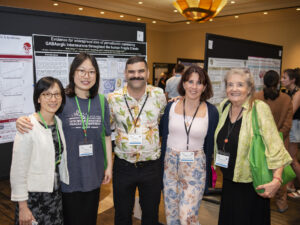About the Study
Who can participate?
To participate in this study, you must be an adult (18 years of age or older) with a first-, second-, or third-degree family member diagnosed with Fragile X syndrome (FXS) or diagnosed with the FXS premutation.
In this study, a “proband” is defined as the first person diagnosed with FXS/FXS premutation within the entire family. Participants in this study should be a blood relative of the proband. First-degree family members include the proband’s parents, full siblings, and children. Second-degree family members include the proband’s grandparents, grandchildren, uncles, aunts, nephews, nieces, and half-siblings. Third-degree family members include the proband’s great-grandparents, great grandchildren, great uncles/aunts, first cousins, half-uncles, half-aunts, half-nieces, and half-nephews.
All sexes and racial and ethnic groups are encouraged to be participants in this study.
What will happen in the study?
If you are interested in this study, the researcher will gladly contact you to discuss the study further. There are two main parts to this study: (1) completing a short screening questionnaire that asks questions such as age, gender, diagnosis and relationship to the proband, and (2) completing a 15-30 minute survey. Both parts of the study can be self-completed online, and the survey may be completed in more than one sitting if needed. Additionally, participants can opt to complete the study with the researcher, in-person at Cincinnati Children’s Hospital Medical Center, or virtually via phone or online meeting.
What are the good things that can happen from this research?
Although you may feel a sense of satisfaction and accomplishments in participating in the research, and ultimately contributing to the field of Fragile X knowledge, there is no direct benefit to the participants of this study. However, survey data are essential to advancing understanding of FXS screening. With this data, screening barriers can be identified, and interventions can eventually be tailored to the community. Additionally, barrier identification may lead to reduced anxiety, frustration, and economic cost for families, earlier access intervention services, improved health literacy, and improved quality of life.
What are the bad things that can happen from this research?
This is a minimal risk study. This means that the potential risks or discomforts that you may experience during the study are not greater than you would ordinarily encounter in daily life. However, online survey research involves two potential sources of risk:
- Potential minimal risk resulting from breach of confidentiality using Qualtrics site to complete the survey
- Potential minimal risk resulting from direct participation in the research (acute emotional reactions to certain questions)
There may be other risks that we do not know about yet. Remember, you do not have to answer any questions that may make you uncomfortable. Participants can stop participating in the study at any time without penalty.
Will I or my child be paid to complete this study?
Participants who complete the study will be placed in a raffle to potentially win one of six $25 Amazon e-gift cards if they choose.


